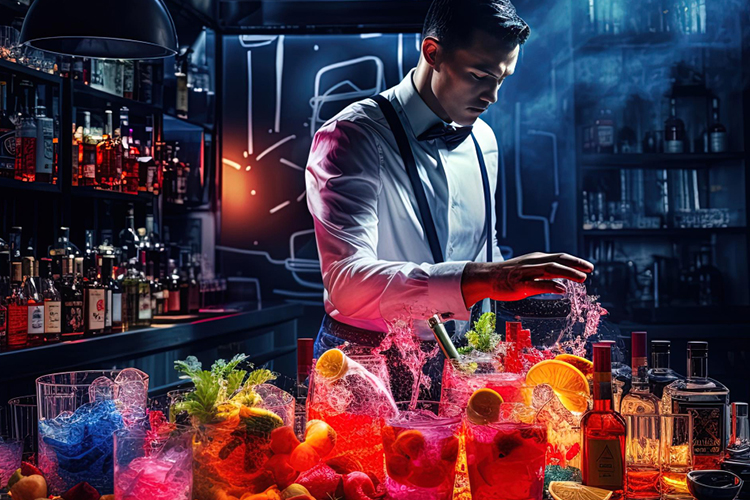In the world of beverages and hospitality, the terms “mixologist” and “bartender” are often used interchangeably, but they represent distinct roles with unique skills and responsibilities. Understanding the differences between a mixologist and a bartender can help clarify their respective contributions to the art of drink making and customer service.

What is a Bartender?
A bartender is a professional who prepares and serves drinks to customers at a bar, restaurant, or other establishment. Their primary responsibilities include:
- Customer Service: Bartenders interact directly with customers, taking orders, making recommendations, and ensuring a pleasant experience.
- Drink Preparation: They mix and serve a wide variety of beverages, including cocktails, beer, wine, and non-alcoholic drinks.
- Speed and Efficiency: Bartenders often work in high-pressure environments where speed and efficiency are crucial to meet customer demands, especially during busy periods.
- Inventory Management: They keep track of bar inventory, restock supplies, and maintain the cleanliness and organization of the bar area.
- Handling Payments: Bartenders handle transactions, manage cash registers, and often deal with tips.
The focus of a bartender is on delivering excellent customer service while managing the bar’s operations smoothly.
What is a Mixologist?
A mixologist, on the other hand, is a professional who specializes in the art and science of crafting cocktails. Their role involves a deeper understanding and creative approach to drink making. Key responsibilities include:
- Crafting Cocktails: Mixologists develop and create innovative cocktail recipes, experimenting with flavors, ingredients, and techniques to craft unique drinks.
- Ingredient Knowledge: They have extensive knowledge of various spirits, liqueurs, bitters, and other ingredients used in cocktails. This includes understanding flavor profiles and how different components interact.
- Presentation and Garnishing: Mixologists pay close attention to the presentation of their drinks, ensuring they are visually appealing as well as delicious. This includes creative garnishing techniques.
- Menu Development: They often play a significant role in developing and curating the cocktail menu for a bar or restaurant, ensuring a diverse and appealing selection of drinks.
- Education and Training: Mixologists may educate and train other bartenders or staff on the finer points of cocktail making and drink presentation.
Mixologists focus on the artistry and innovation of cocktail creation, often elevating the drinking experience through their craftsmanship.
Key Differences
While both bartenders and mixologists work with drinks, their roles and focus areas differ significantly:
- Scope of Work: Bartenders have a broader role that includes customer service, efficient drink preparation, and bar management. Mixologists have a more specialized role focused on crafting and innovating cocktails.
- Skills and Knowledge: Bartenders need strong customer service skills and the ability to work quickly under pressure. Mixologists require a deep understanding of ingredients, flavors, and advanced mixing techniques.
- Creativity vs. Efficiency: Mixologists emphasize creativity and experimentation in drink making, while bartenders prioritize speed and efficiency in serving customers.
- Customer Interaction: Bartenders interact more frequently with customers, providing a direct service experience. Mixologists may also interact with customers but are often more involved in the behind-the-scenes creation of drinks.
Both bartenders and mixologists play essential roles in the hospitality industry, each bringing unique skills and expertise to the table. Bartenders ensure smooth bar operations and excellent customer service, while mixologists elevate the drinking experience through their innovative and artistic approach to cocktails. Understanding the differences between these roles highlights the diverse talents that contribute to a memorable drinking experience.
Interested in becoming a master bartender?
Learn Classic Cocktail Recipes: Master the art of making timeless drinks with step-by-step guidance on crafting classic cocktail recipes.
Expert Instruction: Gain invaluable insights and tips from industry-leading bartenders with years of experience.
Convenient Online Format: Enjoy the flexibility of learning from the comfort of your own home with our fully online course format.
Certificate of Completion: Earn a certification upon completion that showcases your new bartending skills to potential employers.

